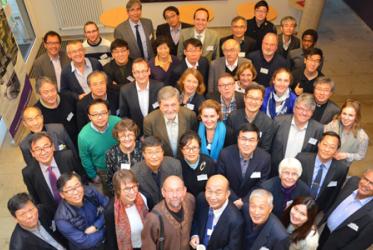Displaying 141 - 160 of 196
Study group focuses on moral discernment in churches
04 August 2016
Hielke Wolters: Apostle of mission strategies
01 August 2016
New Executive Committee members elected in Trondheim
28 June 2016
Orthodox synod “a spiritual gift” to other churches
24 June 2016
International affairs facilitator reflects on pilgrimage
31 March 2016
Religion: Friend or Foe of the Common Good?
16 February 2016
Fleeing from – rather than to – a place
10 February 2016
Symposium focuses on religion, violence, extremism
04 February 2016
Jürgen Moltmann leads ecumenical reflections in Geneva
14 January 2016
Peace cannot be done by bullets, just by encounters
10 December 2015
WCC urges responsibility for and support to the refugees in Europe
04 September 2015











